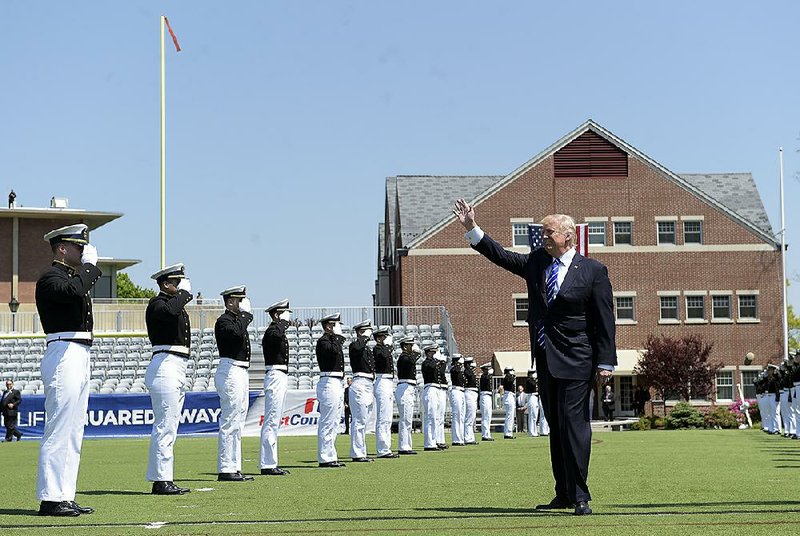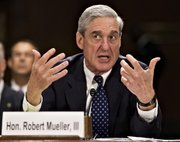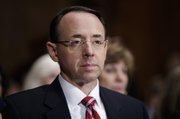WASHINGTON -- The Justice Department has appointed Robert Mueller III, the former FBI director, to serve as a special counsel to oversee its investigation into Russian meddling in last year's election, Deputy Attorney General Rod Rosenstein announced Wednesday.
"I accept this responsibility and will discharge it to the best of my ability," Mueller said in a brief statement.
The appointment of Mueller raises the stakes for President Donald Trump in the multiple investigations into his campaign ties to the Russians. It follows a series of developments that have roiled Washington, including Trump's abrupt dismissal of the FBI director, James Comey, and the disclosure that the president urged Comey to drop the FBI's investigation into Trump's former national security adviser, Michael Flynn.
In a statement released by the White House, Trump said: "As I have stated many times, a thorough investigation will confirm what we already know -- there was no collusion between my campaign and any foreign entity. I look forward to this matter concluding quickly.
[PRESIDENT TRUMP: Timeline, appointments, executive orders + guide to actions in first 100 days]
The appointment gives Mueller broad powers to investigate whether Trump campaign associates colluded with the Kremlin to influence the election outcome in his behalf, as well as the authority to prosecute any crimes uncovered during the investigation.
"I determined that it is in the public interest for me to exercise my authorities and appoint a special counsel to assume responsibility for this matter," Rosenstein said in a statement. "My decision is not a finding that crimes have been committed or that any prosecution is warranted. I have made no such determination.
"What I have determined," he continued, "is that based upon the unique circumstances the public interest requires me to place this investigation under the authority of a person who exercises a degree of independence from the normal chain of command."
While a special counsel would remain ultimately answerable to Rosenstein -- and by extension, the president -- he would have greater autonomy to run an investigation than a U.S. attorney would. Mueller will be able to choose to what extent to consult with or inform the Justice Department about his investigation as it goes forward.
His mandate extends beyond any specific Trump-Russia connection to cover "any matters that arose or may arise directly from the investigation."
In his capacity as special counsel, Mueller will be able to request additional resources for the investigation. Those requests will be reviewed by Lee Lofthus, assistant attorney general for administration.
Rosenstein is overseeing the Russia investigation after Attorney General Jeff Sessions recused himself.
Democrats have challenged Rosenstein's impartiality in the Russia inquiry because he wrote a memorandum used as the rationale for Comey's firing. In the memo, Rosenstein said Comey had violated long-standing Justice Department practices in his handling of the investigation into Hillary Clinton's use of a private email server.
However, shortly after the announcement of Comey's firing, the president said he'd decided to fire Comey before he received the recommendation from Rosenstein.
Mueller is viewed by members of both parties as one of the most credible law enforcement officials in the country. He served Democratic and Republican presidents, from 2001-13, and was asked by President Barack Obama to stay on beyond the normal 10-year term until Comey was appointed.
Inside the FBI, he is known for his gruff, exacting management style -- and for saving the institution. After the Sept. 11, 2001, terrorist attacks, there were calls to break up the FBI and create a separate domestic intelligence agency. Mueller, who arrived at the agency just one week before the attacks, beat back those efforts and is credited with building the modern FBI. He led the investigations into al-Qaida while simultaneously transforming the agency into a key part of the national security infrastructure.
Lawmakers of both parties praised the announcement, with Sen. Dianne Feinstein, the top Judiciary Committee Democrat, saying there was "no better person who could be asked to perform this function."
"He is respected, he is talented, and he has the knowledge and ability to do the right thing," she said in a statement.
Oversight Committee Chairman Jason Chaffetz, R-Utah, said late Wednesday that Mueller is a "great selection. Impeccable credentials. Should be widely accepted."
But Rep. Peter King, R-N.Y., is expressing concern over the wide purview special prosecutors have. King said, "I'm worried with all special counsels because there's no control over them, and they can abuse their power."
Sen. Richard Burr, R-N.C., chairman of the Senate intelligence committee, called the appointment a "good decision."
"By having somebody like Bob Mueller head whatever investigation assures the American people that there's no undue influence, be it here, be it at the other end of Independence Avenue or within the Justice Department or FBI," said Burr, whose committee has been conducting its own investigation into Russia's election interference.
Rep. Elijah Cummings of Maryland, the top Democrat on the Oversight Committee, called Mueller a "solid choice," and commended Rosenstein for putting "our country and justice system first."
The order to appoint Mueller was signed Wednesday by Rosenstein, drawing for only the second time in history on a regulation granting the attorney general the authority to appoint a special counsel. The first time that regulation was used was in 1999 by Janet Reno in the case of Jack Danforth, a former Republican senator from Missouri. He investigated the botched federal raid on the Branch Davidian compound in Waco, Texas, in 1993 that killed 76 people.
Danforth's investigation cost millions of dollars and included hundreds of interviews and a restaging of the final hours of the 51-day standoff with federal agents. He ultimately produced a 150-page report clearing Reno and other top government officials of any responsibility in the case.
The Justice Department said Mueller has resigned from his job at the private law firm WilmerHale to take the job of special counsel. That firm also employs Jamie Gorelick, who has represented Trump's daughter, Ivanka. Another partner, Reginald Brown, is representing Paul Manafort. Manafort is Trump's former campaign chairman and has been a focus of the U.S. investigation into Trump's associates and Russia.
Information for this article was contributed by Rebecca R. Ruiz and Matt Apuzzo of The New York Times; by Eric Tucker, Sadie Gurman, Darlene Superville, Eileen Sullivan and Ted Bridis of The Associated Press; and by Devlin Barrett, Sari Horwitz and Matt Zapotosky of The Washington Post.
A Section on 05/18/2017


